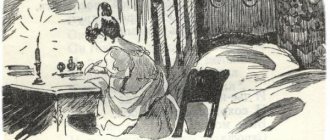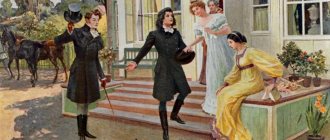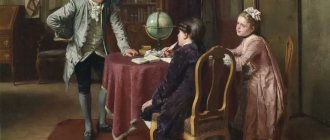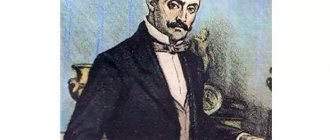Name day of Tatiana Larina
It is no coincidence that Belinsky called the novel “Eugene Onegin” an encyclopedia of Russian life. It picturesquely and realistically shows pictures of the life of the capital and local nobility, with light strokes depicting courtyard people.
One of these paintings is the story of Tatiana’s name day. All the local nobility - the Larins' closest neighbors - gathered for this holiday. The whole house was filled with guests. Pushkin wonderfully depicted their portraits. Some family traits are embedded in their names.
Fat Pustyakov arrived with his portly wife;
This family is not used to particularly caring and worrying. But they love themselves and delicious food.
Gvozdin, an excellent owner, Owner of poor peasants;
This landowner fleeces his men like crazy.
The Skotinins, a gray-haired couple, With children of all ages, counting From thirty to two years old;
A large family, far from the culture of the nobility.
District dandy Petushkov,
A young man who dresses flashily and tastelessly, considering himself something of a socialite.
My cousin brother, Buyanov, in fluff, in a cap with a visor - (As you, of course, know him), And retired adviser Flyanov, Heavy gossip, old rogue, Glutton, bribe-taker and buffoon.
The family of Panfil Kharlikov was present at the celebration, and a visiting Frenchman, Monsieur Triquet, came with them. It’s strange, but the Frenchman’s surname is consonant with the ancient French game of checkers, which was called backgammon. Nowadays this game is known as backgammon.
Having finished describing the guests, Pushkin did not spare colors to describe what was happening at the table. At first everything seems more or less calm:
Conversation fell silent for a moment; The mouth is chewing. From all sides plates and cutlery are rattling and glasses are clinking.
But as the guests get drunk, the dynamics of what is happening increases; in the verses of the poem it is expressed by verbs:
No one listens, they shout, they laugh, argue and squeak.
These people are clearly not burdened by social etiquette and decency. But the general fun is disrupted by the arrival of new guests, who were clearly expected in the Larin family. Pushkin only needed two words to convey his impatience. These words are suddenly and finally.
“Ah, creator! - The hostess shouts: - finally! The guests are crowding in, everyone is taking away the cutlery and chairs as quickly as possible; They call and seat two friends.
Quite by chance, Onegin found himself sitting opposite the birthday girl. The girl was still under the impression of her terrible dream and was ready to cry. Onegin noticed Tatiana’s condition, but, not knowing the true reasons, he felt even more “out of place. He was already annoyed that he had gotten from the ship to the ball. Lensky promised that the name day would be held in a close family circle, but here the entire district “beau monde” gathered. Evgeniy was seriously angry with Lensky, and decided to take revenge on him right here, at the holiday.
By this time, a fat pie was placed on the table and wine was brought in a tarred bottle. Then the guests began to congratulate the birthday girl. Monsieur Triquet sang his poetic congratulations, which he sang to all the birthday girls, only rearranging the names. The guests applauded and began to congratulate Tatyana one by one.
Then everyone present moved into the living room, where there were card tables. The men sat down to play cards, the ladies sat down by the fireplace, and the girls gathered together.
Towards evening, when tea was served, the regimental orchestra entered the living room with music. The presence of musicians promised the youth a ball.
Delighted by the music with thunder, Leaving a cup of tea with rum, Paris of the surrounding towns, Approaches Olga Petushkov, Lensky approaches Tatyana; Kharlikova, Bride of overripe years, My Tambov poet took him, Buyanov sped away to Pustyakova, And everyone poured into the hall. And the ball shines in all its glory.
Onegin began to carry out his insidious plan. He engaged Olga to almost all the dances, flirted with her, which incredibly surprised the guests, Tatyana, and made Lensky jealous, who tried to invite his bride to the cotillion, but this dance was also promised to Onegin.
In a lyrical digression, Pushkin warmly describes the mazurka:
But in the cities, in the villages, the mazurka still retained its original beauty: Jumps, heels, mustaches Still the same.
Only Lensky and a little later Onegin left the Larins’ hospitable home. The rest of the guests made their beds in the house after dinner.
The plot of the provincial holiday serves as a set-up for subsequent events that are developed in the novel. Onegin managed to amuse his pride, but he acted like an egoist who does not think at all about how others felt at that moment.
Name day of Tatyana Larina (Analysis of an episode from the 5th chapter of A.S. Pushkin’s novel “Eugene Onegin”)
V. G. Belinsky called “Eugene Onegin” “an encyclopedia of Russian life,” since it reflected the entire life of the Russian nobility of that era, like a mirror. The poet's focus is on the life, everyday life, morals, and actions of a young man - Eugene Onegin. Eugene Onegin is the first literary hero to open a gallery of so-called “superfluous people.” He is educated, smart, noble, honest, but social life in St. Petersburg killed all his feelings, aspirations, and desires. He “matured before his time” and became a young old man. He is not interested in living. In this image, Pushkin showed the disease of the century - the blues. Onegin is truly seriously ill with the social disease of his time. Even a sincere feeling - love - is not capable of resurrecting his soul.
The image of Tatyana Larina is a counterbalance to the image of Onegin. For the first time in Russian literature, a female character is opposed to a male one, moreover, the female character turns out to be stronger and more sublime than the male one. Pushkin paints the image of Tatyana with great warmth, embodying in her the best features of a Russian woman. In his novel, Pushkin wanted to show an ordinary Russian girl. He emphasizes the absence of extraordinary, out-of-the-ordinary features in Tatyana. But the heroine is at the same time surprisingly poetic and attractive. It is no coincidence that Pushkin gives his heroine the common name Tatyana. By this he emphasizes the simplicity of the girl, her closeness to the people. Tatyana’s dream before her birthday is very significant.
But then guests arrive at the house, Tatiana is seated opposite Onegin, she is silent, ready to faint. Onegin is annoyed by Tatiana's agitated state and the large number of guests. He decides to take revenge on Lensky, who promised that there would be few of them...
As you can see, nightmares begin to come true immediately. Onegin looks at Tatiana with tenderness. “He revived Tanya’s heart,” and then openly courtes Olga. Lensky does not believe his own eyes. When Olga refuses him to dance, since she has already been invited by Onegin, Lensky leaves in anger. The beginning of the tragedy has begun.
It is known that Tatyana is brought up on an estate in the Larin family, faithful to the “habits of dear old times”; Tatyana’s character is formed under the influence of a nanny, whose prototype for the poet was the wonderful Arina Rodionovna. Tatyana grew up as a lonely, unkind girl. She did not like to play with her friends, she was immersed in her feelings and experiences. She early tried to understand the world around her, but did not find answers to her questions from her elders. And then she turned to the books that she believed completely:
She liked novels early on; They replaced everything for her. She fell in love with the deceptions of both Richardson and Rousseau.
The life around her did little to satisfy her demanding soul. In books she saw interesting people whom she dreamed of meeting in her life. Communicating with the courtyard girls and listening to the stories of the nanny, Tatyana becomes acquainted with folk poetry and becomes imbued with love for it. Closeness to the people, to nature develops in Tatyana her moral qualities: spiritual simplicity, sincerity, artlessness. Tatyana is smart, original, original. She is gifted by nature: A rebellious imagination,
With a living mind and will, and a wayward head,
And with a fiery and tender heart. With her intelligence and unique nature, Tatyana stands out among the landowners and secular society. She understands the vulgarity, idleness, and emptiness of life in village society. She dreams of a person who would bring high content into her life, who would be like the heroes of her favorite novels. This is how Onegin seemed to her - a secular young man who came from St. Petersburg, intelligent and noble. Tatyana, with all sincerity and simplicity, falls in love with Onegin: “...Everything is full of him; everything to the sweet maiden repeats about him incessantly with magical power.”
Tatiana's main character traits are a highly developed sense of duty, which takes precedence over other feelings, and spiritual nobility. This is what makes her spiritual appearance so attractive.
Tatyana Larina opens a gallery of beautiful images of a Russian woman, morally impeccable, seeking deep meaning in life. The poet himself considered the image of Tatiana to be the “ideal” positive image of a Russian woman.
In the episode under review, the theme of friendship and love is touched upon, along with other problems. It all started with the fact that in the first chapter the author says about Onegin: “I’m tired of friends and friendship.” But why, who is to blame for this? Probably, in part, Onegin himself, who chose individualism or even egoism in Byron’s works as his ideal. In addition, after a few chapters we learn that there was a bust of Napoleon in Onegin’s office, and Pushkin will say: “We honor everyone with zeros, and ourselves with ones. We all look at Napoleons...” Isn't this, to some extent, about Onegin?
One of the reasons that Onegin is tired of friendship is his blues. But why did she take possession of him, but not the author, who appears as his friend in the novel? They are both smart, honest, they both understand the shortcomings of society, but Onegin has no desire to act, no desire to change anything, no desire to go against this society. He is bored with inaction and doing nothing (as, indeed, with balls and social society), but he doesn’t want to do anything.
And Onegin became friends with Lensky at first simply because in the village where he ended up after the death of his uncle, there was no one else to communicate with. Pushkin calls them (Lensky and Onegin) “friends have nothing to do.” This was so: they both really had nothing to do - Onegin because of his boredom and melancholy, and Lensky because of his inexperience and naivety, he did not know real life, he could not adapt to it. Both the author and Onegin were older than Lensky; their ironic and playful attitude towards his romantic nature is not surprising. Onegin, naturally, was much more experienced, learned from life - he was his friend’s mentor, patron.
Lensky's love for Olga is also a figment of his romantic imagination. No, he did not love Olga, he loved the image he himself created. Romantic image. And Olga... An ordinary provincial young lady, whose portrait the author was “tired of... immensely.” No wonder Onegin, who was much wiser and more experienced than Lensky, said: “I would choose another if I were like you, poet...”.
But why is Onegin so sure that he cannot fall in love himself? He meets Tatyana, that very “other”, and she confesses her love to him (it should be noted, however, that Tatyana is not in love with the completely real Onegin, but partly, again, with an image created on the basis of sentimental books). And what about Onegin? He is sure that he is “not created for bliss”; this is actually not the case. He is simply afraid to love, afraid to awaken feelings killed during his stay in the world. Yes, it was there, in secular society, that he forgot how to truly be friends and love. There, such concepts as friendship and love are absent - they are replaced by lies, slander, and public opinion.
As you can see, Tatiana’s name day is a kind of nerve center of the work, where a dream is a mystical warning, the behavior of a bored Onegin is the beginning of a duel, and Tatiana’s doubts are the forerunner of love.
The immortal work of A.S. Pushkin’s “Eugene Onegin” is rightfully considered an encyclopedia of Russian life. Each fragment plays a very important role in revealing the idea of the novel and in creating images of the main characters, complementing the picture of that reality so dear to the author. In this regard, the episode of Tatyana's name day is very indicative.
The love story of Tatiana and Evgeny develops as the heroes communicate. But communication doesn’t work out. You can’t achieve much with monologues, and conversation doesn’t work. Tatiana writes a letter - Onegin reads a sermon. The girl, having listened to the chosen one, who, in her opinion, was sent by God, withdraws, hides her feeling deep inside, continuing to anxiously hope for happiness. The holiday, which brings together the entire neighborhood - the local nobility - in the house, becomes the culmination of the first stage of this novel. It is no coincidence that it is preceded by sleep. As in all of Pushkin’s works, he is prophetic. Longing for love paints Tatiana the image of Onegin as the leader of a gathering of monsters:
...the eyes of all, Hooves, crooked trunks, Tufted tails, fangs, Mustaches, bloody tongues, Horns and bone fingers...
The guests gathered for the name day are surprisingly similar to the monsters from the dream.
It is enough to compare two episodes: Barking, laughter, singing, whistling and clapping, Human rumor and horse tramp!
This is how a gang of brownies appears in a dream. The same nominative sentences characterize the gathering of guests in the Larins’ house:
The barking of the mosquitoes, the smacking of the girls, the noise, the laughter, the crush at the threshold, the bows, the shuffling of the guests, the nurses' cry and the crying of the children.
Why are monsters from dreams associated with name day guests? Maybe because these are the people who will play a decisive role in the conflict of the main characters.
Tatyana has learned the lesson given by Onegin, but has not yet learned to “control herself,” so at the sight of a dear person she almost loses consciousness:
And, paler than the morning moon And more trembling than a driven doe, She does not raise her darkening eyes: a passionate heat glows violently in her; she feels stuffy, sick...
However, Onegin becomes irritated at the sight of such behavior of the rural simpering woman; the visitors present - even the chewing ones - seem to be hateful witnesses. And the hero becomes a helipad: a cruel joke entails a duel and the death of Lensky. The dream comes true... It reveals the deep essence of Onegin, who is at the same time both the master and the captive of his character, his inner essence. In order to satisfy his ambitions, he gives free rein to base feelings in order to enjoy revenge.
The author characterizes the disease of his generation in the second chapter:
We honor everyone with zeros, and ourselves with ones. We all look at Napoleons; There are millions of two-legged creatures...
Thus, the hero’s offended pride guides his actions, which he will soon bitterly regret.
At Tatiana's name day, the heroes meet for the third, but not the last time. The next meeting will take place in three years... We will find out how the village simpleton will change during this time in the last chapter. All lessons will be taken into account, all manners will be honed and brought to perfection. How will the metamorphosis of A.S. occur? Pushkin will describe in the following chapters.
Reading in the section:
- Essay on the topic: “What is the tragedy of Onegin”
- Lyrics by A.S. Pushkin. Composition.
- The significance of the Kalmyk fairy tale in revealing the images of the heroes of Pushkin’s story “The Captain’s Daughter”
- Was my Eugene happy? Essay based on the novel “Eugene Onegin”
- “And happiness was so possible...” based on the novel “Eugene Onegin”
- Features of the dramaturgy of Pushkin A.S.
- Why did Hermann go crazy? Essay on the story “The Queen of Spades”
Previously published in the section:
- My attitude to the novel “Eugene Onegin”
- Onegin and Lensky comparative characteristics. Composition
- The image of Tatyana Larina in the novel “Eugene Onegin”
- Political lyrics by A.S. Pushkin
- Three circles of nobility in the novel “Eugene Onegin”
- The image of Emelyan Pugachev (based on the novel “The Captain’s Daughter”)
New section materials:
- Analysis of the poem by A.S. Pushkin "Monument"
When was Tatyana Larina born?
True, Pushkin’s hero was only 25 years old, but to a 9th grade student he seems like a fairly mature guy. In any case, the life and problems of this inhabitant of the 19th century are of little interest to a fifteen-year-old ninth grader living his life in the 21st century. Two hundred years later!
Of course, beautiful, sonorous poems can enchant. Written so freely that you don’t even feel that these are poems. Written mainly about women. About breasts, about legs, about cheeks. Some ardent children can be so excited by these cheeks that they will not be too lazy to go to the Internet and ask the omniscient Google what it is. Google will answer: nothing special, just cheeks. And yes, the indecent-sounding word “tsevnitsa” is also only a multi-pipe flute (also called the “Pan flute”).
However, if a young man of our century knows how to use the Internet, he will find many mysteries in Eugene Onegin that will certainly baffle the teacher. What a thrill! And, by the way, if this ninth grader is a little skilled in logical reasoning, he can easily find answers to his questions. And if at the same time he does not enjoy his superiority over the teacher too much (note, imaginary, because the teacher can ask questions to the great Google, but he still knows more), then an A for penetrating the material of Pushkin’s novel in verse will be for the boy or the girl is provided for.
Note that to answer such questions you need to know the text of “Eugene Onegin” well. Therefore, just a quarter of a century ago, only an experienced Pushkin scholar could give the correct answer to them. Now even a schoolchild, armed with such a powerful weapon as a search site, can do this. At the same time, the student does not even imagine the full power of the weapon he is using. So even a ninth grader will find it useful to answer the questions below.
Well, let's move on to the questions?
1. What is Tatyana Larina’s middle name?
This question is one of those for which you should carefully read the text of Pushkin’s novel. The answer is in chapter two, verse XXXVI, where Pushkin describes the grave of Tatyana's father.
He was a simple and kind gentleman, and where his ashes lie, the tombstone reads: The humble sinner, Dmitry Larin, the Lord's servant and foreman, tastes peace under this stone.
So the main character of the novel is Tatyana Dmitrievna Larina. By the way, her father left the army not in low ranks. Brigadiers were in the army of the Russian Empire during the time of Catherine II. This rank was located between major and colonel. That is, in our language, Tatyana’s father was a lieutenant colonel. Those interested can refer to any article devoted to the “Table of Ranks” to find out at what age an officer could usually receive such a rank and thereby determine the age at which Dmitry Larin retired and married Tatyana’s mother. He, of course, was older than the girl who was in love with her own age.
This Grandison was a glorious dandy, a player and a sergeant of the guard.
Why the same age? This can be considered an additional question for the savvy and curious. A little hint: you should find out at what age the young man could have become a guard sergeant. An additional bonus will be given to those who still remember that the first chapter of “The Captain’s Daughter” is called “Sergeant of the Guard,” and its hero, young Petrusha Grinev, was precisely in this rank.
2. What was the name of Tatyana Larina’s mother?
The answer is also contained in only one place in the novel, in chapter seven, verse XLI. Mother brought Tatyana to Moscow, “to the brides’ fair” (note, not “to the fair”), and decided to stay with her cousin. And here is the meeting, exclamations, delight and gossip:
- Princess, mon ange! - “Pachette!” - Alina!
Alina is the name of my mother’s cousin, Tatyana’s aunt. "Pachette!" can be translated from French as “Pashenka”. And “Pasha” is an affectionate derivative of three Russian female names, Polina, Praskovya or Pelageya. One of these names is the name of Tatyana’s mother.
3. When was Tatyana Dmitrievna Larina born?
One of the important episodes of the novel is Tatiana’s name day. St. Tatiana's Day (“Tatiana's Day”) is January 12 according to the old style or January 24 according to the new style.
The novel takes place in the 1820s. Is it possible to find out exactly what year? Yes, it is possible with the help of a little literary and calendar research. Here it is quite possible to rely on the text of the novel, for Pushkin argued that its action was calculated according to the calendar. In chapter four, verse XLIX, Lensky says to Onegin:
- Yes, Tatyana’s name day is Saturday.
In the 1820s, St. Tatiana's Day fell on a Saturday only in 1824. How old is Tatyana this year? Pushkin writes to Vyazemsky on November 29, 1824 about the key episode of his novel: “... a letter from a woman, also 17 years old, and also in love!” Tatiana wrote the letter in the previous summer of 1823. During an explanation with Onegin about this letter, the song of girls picking berries plays in the background. This episode is also voiced in the opera.
So, in 1823, Tatyana Larina was already 17 years old. Consequently, her 18th birthday was celebrated on January 12, 1824. Simple arithmetic leads to the exact conclusion: Tatyana Larina was born on January 12 (24), 1806. On January 24th of this year she turned 260 years old!
4. When was Eugene Onegin born?
Well, everything is simpler here. Eugene Onegin killed Vladimir Lensky in the winter of 1824 at the age of 26.
Having killed a friend in a duel, Having lived without a goal, without labor Until twenty-six years old, (Chapter 8, verse XIII)
So, Onegin was born in 1798. That is, he is one year older than Pushkin. They could well be friends, as is written about in the first chapter. Actually, the action of the novel, Onegin’s entry into the world, begins when he was 17 years old, that is, in 1815.
Isn’t it true that quite a lot of information can be gleaned from the Encyclopedia of Russian Life? Who named this novel in poems by A. S. Pushkin? With this question, welcome to Google. He will say.
Tags: novel, Alexander Pushkin, interesting fact, literature





